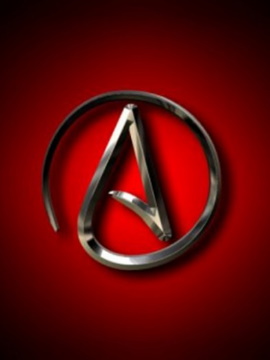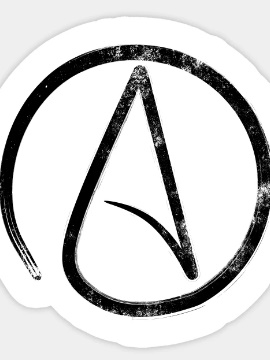Is Religion A Force For Good?
James C. Rocks [2023-09-22]
 The claim is often made that atheism is immoral and that religion is essential for any moral life to be lived yet the evidence suggests nothing could be further from the truth.
The claim is often made that atheism is immoral and that religion is essential for any moral life to be lived yet the evidence suggests nothing could be further from the truth.
Atheism Day, 2022
James C. Rocks [2022-04-01]
 A few days ago, I learned that March 23rd is Atheist Day. That means I ought to write something about it and, naturally, it ought to be about atheism. I plumped for, "What do I think atheism is (on a personal level)?", "What does atheism mean to me?" and "What do I think an atheist should be?" Sadly, that's more than a little complicated.
A few days ago, I learned that March 23rd is Atheist Day. That means I ought to write something about it and, naturally, it ought to be about atheism. I plumped for, "What do I think atheism is (on a personal level)?", "What does atheism mean to me?" and "What do I think an atheist should be?" Sadly, that's more than a little complicated.
Here's To Doubting Thomases
Crispin Sartwell [2022-02-02]
 From ministers preaching funeral sermons for suicide victims and recounting stories of their despair while praising their god for its intervention to those who believe their god wants them to crash airliners into buildings even as others thank their god for helping some of them escape from the same, there's always going to be that someone at the back of the crowd saying, "Huh?"
From ministers preaching funeral sermons for suicide victims and recounting stories of their despair while praising their god for its intervention to those who believe their god wants them to crash airliners into buildings even as others thank their god for helping some of them escape from the same, there's always going to be that someone at the back of the crowd saying, "Huh?"
On Speciation (Why Micro & Macro Evolution Aren't Things)
James C. Rocks [2022-01-12]
 Creationists are quick to claim that micro-evolution happens, allowing them to accept small changes whilst simultaneously denying macro-evolution, the larger ones required to evolve new "kinds" of life. It requires little more than casual investigation to expose the underbelly of this claim and realise that such a distinction is entirely artificial.
Creationists are quick to claim that micro-evolution happens, allowing them to accept small changes whilst simultaneously denying macro-evolution, the larger ones required to evolve new "kinds" of life. It requires little more than casual investigation to expose the underbelly of this claim and realise that such a distinction is entirely artificial.
Praying For Conversion
Unknown [2021-08-03]
 The following (hysterically funny) message was posted to an atheist newsgroup. It "takes the rise" out of Christians who, for whatever mentally imbalanced reason, have decided that atheists are heathens and it is their god-given task to convert them.
The following (hysterically funny) message was posted to an atheist newsgroup. It "takes the rise" out of Christians who, for whatever mentally imbalanced reason, have decided that atheists are heathens and it is their god-given task to convert them.
Things You Shouldn't Say To An Atheist
James C. Rocks [2021-07-07]
 I have been debating creationists and fundamentalists for the best part of thirty years (since the early nineties) and in my online life, I have been asked some really daft questions as well as been subject to some equally daft accusations. This article deals with some of them and gives reasonably concise answers to them.
I have been debating creationists and fundamentalists for the best part of thirty years (since the early nineties) and in my online life, I have been asked some really daft questions as well as been subject to some equally daft accusations. This article deals with some of them and gives reasonably concise answers to them.
The Physics of Santa Claus
Unknown [2020-12-24]
 I'm a geek, an atheist and [somewhat] pro-science but I still love Christmas so is it any surprise that I love humorous pieces like this one? It's arguably one of my all-time favourite pieces of Christmas fun. Bear in mind this was first published way back before the millennium so some of the figures are a little dated; for example, there are probably around two and half billion children in the world today compared to a mere two billion back then.
I'm a geek, an atheist and [somewhat] pro-science but I still love Christmas so is it any surprise that I love humorous pieces like this one? It's arguably one of my all-time favourite pieces of Christmas fun. Bear in mind this was first published way back before the millennium so some of the figures are a little dated; for example, there are probably around two and half billion children in the world today compared to a mere two billion back then.
Was There A Real Jesus?
James C. Rocks [2020-10-05]
 There exists precious little verifiable evidence for the existence of the Christian messiah, Jesus Christ, and that which does exist is at best anecdotal with much of it flawed and presumed fake. My assumption is that Jesus Christ never existed because there is no specific need for a real messiah to form the root of the Christian myth since common traits with pre-existing religions suggest aspects of the character, if not the whole, to be based on earlier myth rather than a real person. This article explains my current reason for taking the stance I do.
There exists precious little verifiable evidence for the existence of the Christian messiah, Jesus Christ, and that which does exist is at best anecdotal with much of it flawed and presumed fake. My assumption is that Jesus Christ never existed because there is no specific need for a real messiah to form the root of the Christian myth since common traits with pre-existing religions suggest aspects of the character, if not the whole, to be based on earlier myth rather than a real person. This article explains my current reason for taking the stance I do.
The Essential Beliefs Of Christianity
James C. Rocks [2020-09-23]
 I think it's fair to say that religions generally request, often demand, respect from us all as if they believe we should believe their views are in some way the equal of those that accept science as the focus of discovery and explanation.How about Christianity?
I think it's fair to say that religions generally request, often demand, respect from us all as if they believe we should believe their views are in some way the equal of those that accept science as the focus of discovery and explanation.How about Christianity?
The Book Of Creation
Tony Hendra & Sean Kelly [2020-09-01]
 "The Book of Creation" by Tony Hendra and Sean Kelly is a parody of one of the biblical books of Genesis. It is aimed more at creationists and fundamentalists than it is at moderate Christian believers. Perhaps of greatest interest to those of us who can remember them, Hendra and Kelly were once part of National Lampoon, an American humour magazine which ran from 1970 to 1998. It did the rounds during my early online debating years but was subsequently included in Hendra & Kelly's book, "Not The Bible".
"The Book of Creation" by Tony Hendra and Sean Kelly is a parody of one of the biblical books of Genesis. It is aimed more at creationists and fundamentalists than it is at moderate Christian believers. Perhaps of greatest interest to those of us who can remember them, Hendra and Kelly were once part of National Lampoon, an American humour magazine which ran from 1970 to 1998. It did the rounds during my early online debating years but was subsequently included in Hendra & Kelly's book, "Not The Bible".